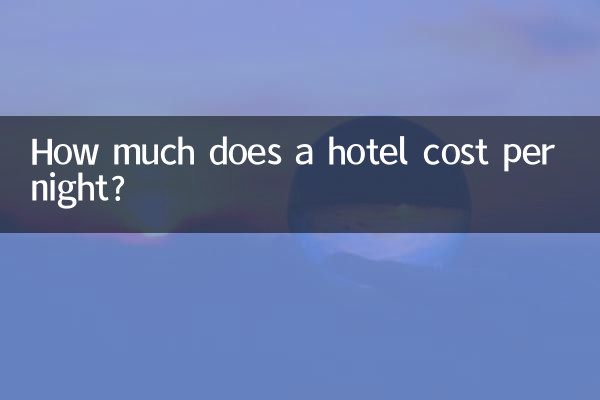How much does a hotel cost per night: Hot topics on the Internet and structured data analysis
Recently, hotel prices have become one of the focuses of public attention. Whether it is a business trip, vacation or temporary accommodation, the nightly cost of a hotel is directly related to consumers' budget planning. The following is a structured data analysis related to hotel prices in hot topics across the Internet in the past 10 days to help you quickly understand the current market conditions.
1. Hot Topics and Trend Analysis

1.Summer travel season drives up hotel prices: With the arrival of the summer tourism peak, hotel prices in popular tourist cities have generally increased by 20%-30%, especially the demand for family hotels and resort hotels has surged.
2.Budget hotels vs. high-end hotels: Consumers are paying more attention to cost-effectiveness. Searches for budget hotels increased by 15% year-on-year, while bookings for high-end hotels dropped slightly.
3.Competition between B&B and short-term rental platforms: Promotional activities on platforms such as Airbnb and Meituan B&B have attracted some travelers, causing traditional hotels to face price adjustment pressure.
2. Hotel price structured data
| city | Budget hotel (per night) | Mid-range hotel (per night) | High end hotel (per night) |
|---|---|---|---|
| Beijing | 200-400 yuan | 500-800 yuan | 1000-3000 yuan |
| Shanghai | 250-450 yuan | 550-900 yuan | 1200-3500 yuan |
| Guangzhou | 180-350 yuan | 400-700 yuan | 800-2500 yuan |
| Chengdu | 150-300 yuan | 350-600 yuan | 700-2000 yuan |
| Sanya | 300-600 yuan | 800-1500 yuan | 2000-5000 yuan |
3. Key factors affecting hotel prices
1.geographical location: Hotel prices in city centers or near scenic spots are generally higher than in suburban areas. For example, hotel prices in the Wangfujing area of Beijing are more than 50% higher than those outside the Fifth Ring Road.
2.seasonal fluctuations: Prices rise significantly during peak tourist seasons (such as winter and summer vacations, and holidays), while there may be multiple discounts during off-season.
3.Facilities and Services: Hotels that offer extras like breakfast, free parking, or a pool tend to be more expensive.
4. Consumer Behavior Analysis
According to search data in the past 10 days, consumers pay most attention to the following aspects when choosing a hotel:
| focus | Proportion |
|---|---|
| Price Reasonability | 45% |
| health and safety | 30% |
| transportation convenience | 15% |
| User reviews | 10% |
5. Forecast of future trends
1.The popularity of dynamic pricing: More and more hotels are adopting dynamic pricing strategies to adjust prices according to real-time demand. Consumers need to plan their itinerary in advance to obtain discounts.
2.The rise of green hotels: Eco-friendly hotels may be a new hotspot, attracting travelers focused on sustainable living despite being slightly more expensive.
3.Sharing economy impact: Competition between B&Bs and hotels will continue, and price wars or promotional activities may further affect the market structure.
Conclusion
The price of a hotel night is affected by multiple factors, from city differences to seasonal fluctuations, and consumers need to make flexible choices based on their own needs. Through structured data analysis, we can more clearly grasp the current market dynamics and provide reference for travel decisions.

check the details

check the details